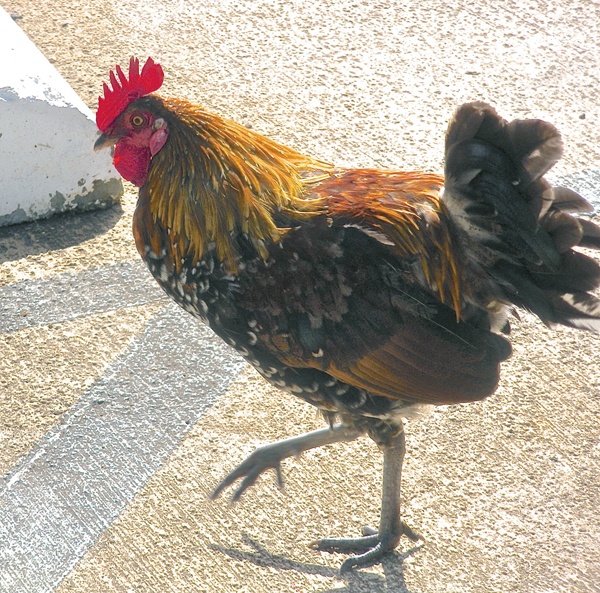LIHUE — About three days ago, Lihue resident Joseph Manini Jr. noticed something unusual and quite disturbing in front of the Historic County Building. Chickens were dying. “One day, I saw one fall right out of a tree,” the 63-year-old
LIHUE — About three days ago, Lihue resident Joseph Manini Jr. noticed something unusual and quite disturbing in front of the Historic County Building.
Chickens were dying.
“One day, I saw one fall right out of a tree,” the 63-year-old said.
More than 10 dead chickens were shoveled into a Division of Forestry and Wildlife truck in front of the statue near the busy intersection on Wednesday.
The smell of death permeated the stuffy humid air and feathers drifted through the slight breeze.
“Some of the chickens have been dead for awhile,” said Jason Vercelli, wildlife biologist with the division. “Others, not that long.”
The chickens will be shipped to the Department of Agriculture on Oahu for testing to determine cause of death, he said.
Kauai’s chickens — it’s estimated there are hundreds of thousands — are fairly famous. Their images are on T-shirts and cups and other items. They are used in promotions. Tourists photograph them. Residents have a love/hate relationship with them. They were even the subject of an article by The New York Times earlier this year.
Manini Jr. said he and friend Cecilia Isobe, 69, come to the park to feed the birds bread, chips and occasionally Kelloggs Corn Flakes, because he “loves the birds.”
But he’s really concerned about the public health. He called several agencies across Kauai, including the Kauai Humane Society.
The humane society let other agencies take the lead on the matter, said KHS Executive Director Penny Cistaro.
“Is it endangering our health?” Manini Jr. asked.
He said he’s sad about the dead chickens. He and his friends can only speculate as why they died.
“There were like 15 chickens at one point,” Manini Jr. said. “ Now, maybe just two roosters and a hen.”
Samples of the dead chickens to determine cause of death are expected in Honolulu today, said a USDA spokeswoman.


